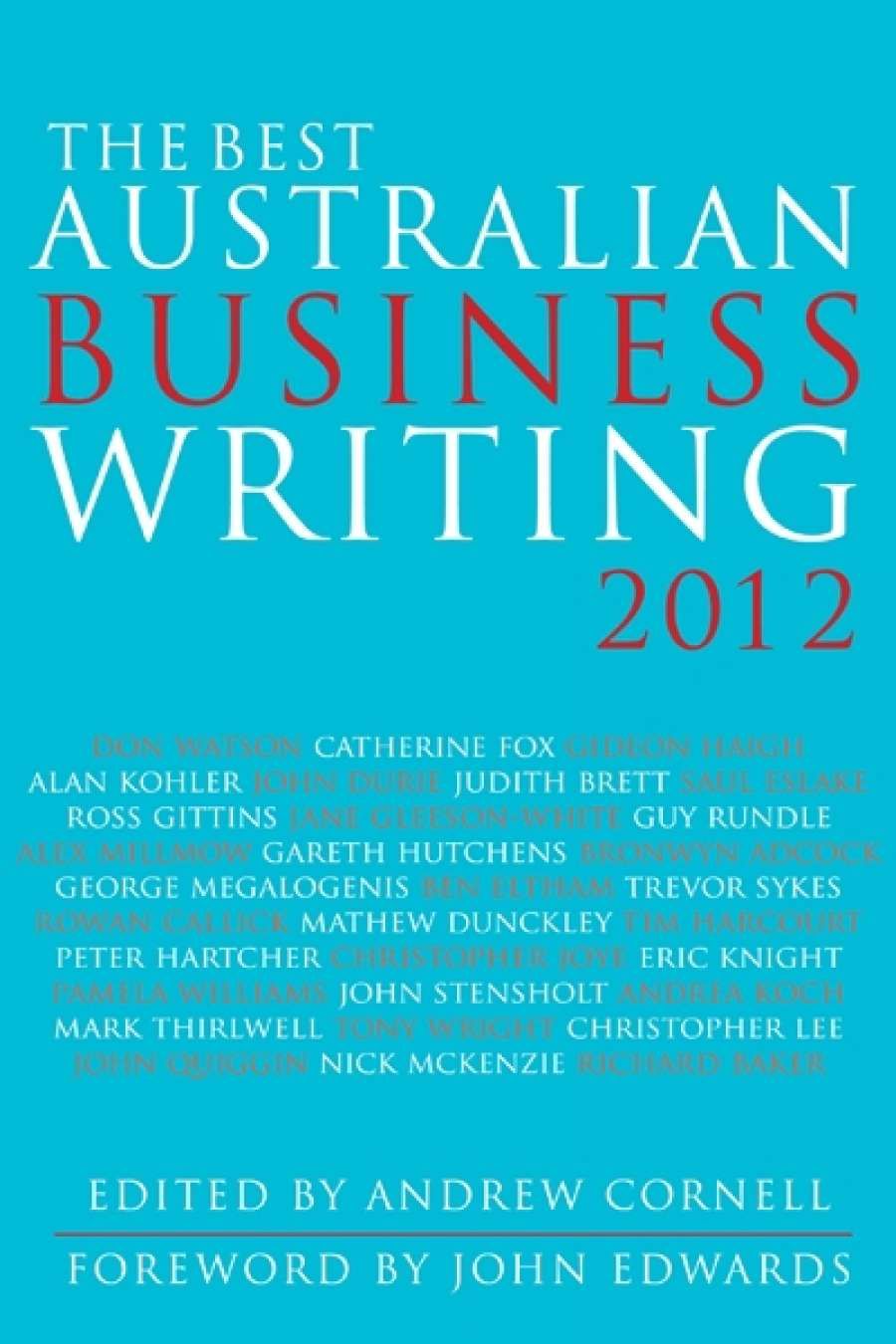
- Free Article: No
- Contents Category: Anthology
- Review Article: Yes
- Online Only: No
- Custom Highlight Text:
Business journalism suffers from an image problem. It is seen as the journalism of insiders, often plagued by an argot as incomprehensible to outsiders as it is to those who use it. Its cosiness with corporations is suggestive of a provenance that is far from unimpeachable. Worst of all, when the global financial crisis hit, journalists on the financial beat were seemingly missing in action.
- Book 1 Title: The Best Australian Business Writing 2012
- Book 1 Biblio: NewSouth Publishing, $29.99 pb, 256 pp, 9781742233628
Things have improved slightly since then. More often than not, the best American business journalism is found not in the business sections of broadsheets, but in popular magazines. The October edition of New York magazine had AIG’s departed boss and walking ideological contradiction Bob Benmosche on its cover. A fully clothed Paul Krugman has graced the pages of Playboy, and Rolling Stone has levelled withering critiques at two symbols of laissez-faire capitalism in overdrive: Goldman Sachs and Bain Capital.
The US example demonstrates an unsurprising truth: outsiders, who are less likely to form fawning relationships with the business community, have a much better strike rate when it comes to hard-hitting, compelling analysis. Yet the discipline does not have the same exposure in Australia, perhaps because our magazine market is dwarfed by comparison. And so we are left to contend with the usual suspects: the Australian Financial Review, the business pages of our broadsheets, the odd piece in the Monthly. It would seem that consumers of business journalism, much like its contributors, are a mostly staid niche.
The Best Australian Writing 2012, edited by Andrew Cornell, is a new anthology from NewSouth that aims to challenge these perceptions. But it gets off to a rocky start: the blurb frames the anthology by asking the following questions: ‘Have baby boomers been forced back to work since the GFC? Is GDP really a reliable measure of our economy? Is airport security a waste of time?’ This is not the strongest opening gambit for an anthology that hopes to show ‘just how good – and how important – writing about business can be’.
Indeed, much of the most fascinating material selected by Cornell is elided in the blurb. Jane Gleeson-White’s essay on the foundations of double-entry bookkeeping is a wonderful opening read, deftly weaving in a history of the discipline’s Venetian roots with the alarming state of corporate accounting failures today. Gideon Haigh’s ‘Love for Sale’,excerpted from his most recent tome on the evolution of the workplace, chronicles gender politics with typical elegance. Richard Baker and Nick McKenzie’s exposé of alleged foreign bribery involving the note-printing company Securency – which is half-owned by the Reserve Bank – is a remarkable display of investigative journalism; it reveals one of the most significant scandals in Australia’s corporate history. Michael Wesley’s primer on the rise of Chinese telecommunications supplier Huawei is lengthy but important.
There are few new voices in this essay collection to inveigh against the financial policy élite. Alan Kohler, George Megalogenis, Peter Hartcher, John Quiggin, Christopher Joye: these are familiar names with familiar ideas. Megalogenis, one of the more accomplished commentators in recent memory, begins his incisive piece with a tiresome cliché about ‘our most indulged generation, the baby boomers’. Kohler’s piece on the need for radical bank reform pulsates with urgency, but ultimately feels constrained by its brevity. Rather than simply cast the bankers as villains, it would have been more useful to have Kohler delve into the overarching narrative of systemic failure within the system. For those less familiar with the anatomy of a financial crisis, it would be helpful to understand how low capital requirements, weak leverage limits, and shoddy lending practices came to define modern banking.
Some articles fall short. Tony Wright’s one on privacy and Google provides few new revelations; Don Watson’s ‘Tower of Babble’ is a fluent but well-rehearsed treatise on management-speak and weasel words. Watson’s dyspeptic critique of such modern-day linguistic abominations as ‘organisational aspirations’ or the ‘Accelerated Collaborative Event’ is riveting, but one gets the sense that he is coasting. One wonders what Watson would make of the contribution by The Age’s economics editor, Ross Gittins, whose solid, if uninspired, take on Australia’s productivity paradox recalls the refrains of HR manuals: ‘In high-performing outfits, managers and supervisors devote more time to managing their people, have clear values and practise what they preach.’
At first, economist Saul Eslake’s lament on the woes of increased airport security seems like a curious addition. At times it reads like the work of an erudite blogger who takes to the Internet to complain that his bottle of shaving cream or duty-free booze was ‘confiscated by an eagle-eyed official in the name of “security’”. But the article gets more meaty as it progresses, with Eslake drawing some interesting conclusions about the cost of security. He also throws in some wit for good measure: ‘I can’t help but wonder,’ he writes, ‘whether Australia’s unemployment rate would have been higher, or the labour force participation rate lower, had it not been for the creation of tens of thousands of these [security] jobs’.
No Australian anthology of writing would be complete without an emphasis on sport. These pieces were the ones I enjoyed most, despite being a veteran indoorswoman. Drama punctuates Christopher Lee’s portrayal of the beginnings of World Series Cricket, and it also envelops Trevor Sykes’s account of the poor performing, financially beleaguered Port Adelaide football club. It is stories like these – and the surprising conclusions they reach – that make this anthology so enjoyable.


Comments powered by CComment